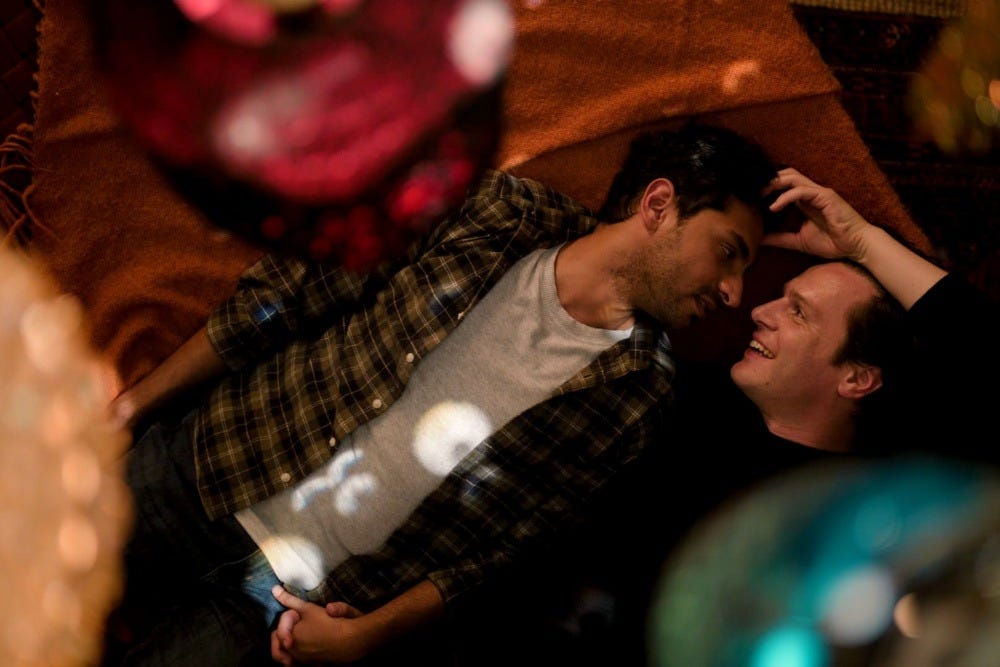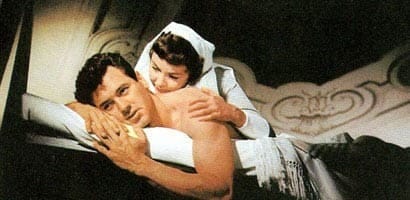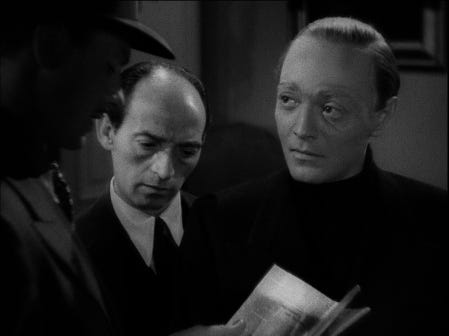The Film Maven Film Diary for January 2024
The best (and worst) of what we've watched this month
Well, gang, we made it through January. If you were planning on doing Dry January I congratulate you all the more because I think everyone came out of this month either needing a drink or, in my case, wondering if they should start. With the world turning into the hot mess express at a rapid pace I fell back onto an adage I’ve always clung to: life’s too short to waste on bad movies. So we’ved decided to let everyone know what we’re watching in a month and what you should be spending your time on. So let’s look at what we thought was the best and everything else!
(“The Rest” does not imply these movies are bad, though some might be. Just that they didn’t really stick with me as the month went on.)
The Best
Sudden Fear (1952)
Sudden Fear has been on my to-watch list for awhile. I even have a copy of it on an old hard drive somewhere where I stored my digitized films (or films I’d borrowed), and yet it’s only last month I sat down to finally watch it but it was worth the wait. Joan Crawford in the 1950s is a mixed bag as her acting was overshadowed by the extreme garishness of her appearance. But this is before all of that. Joan is definitely giving some big histrionics (watch her fling herself around the walls of a room while hearing she’s about to be murdered), but it’s nicely tempered by the incredible work of Jack Palance and Gloria Grahame. Where Joan is cold and not particularly sexual, Palance and Grahame convey all the horniness you need. -KL
City Wide Fever (2025)
My friend Josh Heaps invited me to screen his new film City Wide Fever a few weeks ago at the Criterion offices (yes, it was as cool as you’re picturing), and as you can imagine, I’m always eager to support the work of a friend. But it’s safe to say I’d be recommending this one whether or not I knew Josh personally. This gritty Giallo-style psychological rollercoaster feels right at home with the best NYC conspiracy thrillers ever made, and its low budget spirit gives way to an independent feel across all aspects of the film that makes its heart and soul shine through. A film that feels wholly original and lovingly crafted in the image of its influences, this is one you should keep in mind when it comes to 2025’s genre festival circuit. -LB
Deja Vu (2006)
I was talking to a friend about directors and mentioned, “Damn, I miss Tony Scott.” It wasn’t just that Scott was a master of rapid-fire editing and pure popcorn fun grounded in grit, he made movies that were fun. Go watch Domino or True Romance and just revel in a guy that found the fun in film. Or, you could watch Deja Vu which might officially be my favorite T.Scott film. Denzel Washington, a longtime T.Scott collaborator, plays an investigator trying to find a terrorist bomber. At a certain point the silliest sci-fi twist is introduced in the most deadpan way and you either eat it up or call bullshit. I ate it up!
Unlike other post-9/11 cinema, Deja Vu feels different considering this is about domestic terrorism (and, ooo, time told once you find out who’s playing the terrorist true believer). It’s also aged incredibly well, unfortunately. Also, shout-out to the needle drop which I’m sure cost them a lot of money and they said, “We’re gonna wear it out!” -KL
They Shoot Horses, Don’t They? (1969)
This Sydney Pollack-directed drama should be studied in history classes. I’m pretty sure we might be living it right now. Based off Horace McCoy’s novel of the same name, the film follows participants during the Great Depression participating in a dance marathon. What starts out as fun trudges on for months with the participants committed to winning the money that comes with being the last couple on the floor. Full disclosure, I only knew this as the title of an episode of Gilmore Girls where Rory made the first of a string of bad decisions (Team Dean, forever!).
But nothing can prepare you for the two hours that follows. The performances are flawless, to be sure, but the utter darkness of the movie is so pervasive, depressing, and awe-inspiring. Gig Young, in an Oscar nominated performance, says it all when he declares the marathon goes on. The metaphor for our current landscape is overt. This is a movie that punches you in the face and tells you to like it, and you do. -KL
The Long Weekend (2022)
You’ve seen me talk about Verite grimelord David Dawson in some of these lists and here’s another recommendation for one of his films. The DIY filmmaker certainly loves to make messes, but in an effort to see a different side of him I explored his defining non-genre work The Long Weekend. It’s a film that revels in its reality, which is especially powerful because of the way it explores the complicated connections between male friends. Not that that’s far off from Dawson’s more gruesome fare, but this decidedly more quiet and contemplative experiment proves he can do poignant as well as he can do testosterone-smeared terror. Check this one out on Tubi on a long weekend. -LB
Companion (2025)
I wrote a whole review laying out my love for Companion, which you can read at the link above. Sophie Thatcher continues to cement herself as the thinking man’s final girl. The AI themes are familiar but it does beg the question: when are we gonna start talking about what a gender swapped version of this story looks like? -KL
We Don’t Feel Pain!! (We Tried a Ritual) (2020)
If you’re a found footage head or just an internet horror nerd you may have heard about the indie darling film Milk & Serial that took the genre by storm last year when it was uploaded to YouTube by young filmmaker Curry Barker. While I commend everything going on in that film and the originality that made it stand out so plainly when it went viral, I recently came across a short Barker did that was even more effective. We don’t feel pain!! (We tried a ritual) is so successful because of its undeniable naturalism, something that also makes Milk & Serial work, but with this short everything feels cleaner, more succinct. The get-in-get-out approach works wonders here and it shows Barker doesn’t need all manner of showy tricks to keep an audience entranced. -LB
The Librarians (2025)
I didn’t get to see much out of Sundance but after seeing Kim Snyder’s The Librarians I didn’t need to see anything else. A vital piece of filmmaking that will make you angry, weep, and want to read a good book. -KL
The Girl With the Needle (2024)
Every film festival I go to I’m bound to miss at least one film everyone ends up talking about. At Cannes 2024 that was the Danish nightmare The Girl With the Needle. I finally got around to watching it now that it’s streaming on Mubi and I honestly am disappointed that I went nearly a year without experiencing it. The movie isn’t for the faint of heart, but if you can soldier through its punishing runtime—which isn’t actually that long, but the film is intentionally paced in such a way that you truly feel the film’s lead Karoline’s struggle as she trudges through her fractured life—it rewards you with a harrowing story told by some utterly unforgettable performances. There’s a reason this film is competing for the international Oscar this year; Personally, I hope it wins. -LB
The Florida Project (2017)
I’m no Sean Baker expert but I feel there’s B.A. (before Anora) and A.A. (after Anora) in looking at his filmography. Before Anora and her Brooklyn accent stole my heart my favorite Baker film was his 2015 feature Tangerine. I loved how frenetic and alive it felt, also that it was an L.A. story that still found something passing for glamorous in the story of two trans sex workers trying to get through Christmas Eve. I’d been told The Florida Project would make or break whether I was a Baker stan and…I think I am.
Baker’s said this is his tribute to Our Gang, a Depression-era series that let children play and have fun without taking note of the poverty they grew up in. Such is the case with this story of a little girl named Mooney (Brooklynn Prince), growing up amongst a poverty-stricken community living in a longterm hotel near Walt Disney World alongside her sex worker mother. Much like Anora, The Florida Project makes the day-to-day actions of its characters interesting, fun, frustrating, sad. Prince is great but Bria Vinaite, as Mooney’s mom, is heartbreaking for her mutual love and failing for her child. Another brilliant piece of humanity from Baker. -KL
And the Rest
A Nice Indian Boy (2025)
I hope this gets a wide release soon because sometimes you just want a sweet rom-com about generational differences. If anything, we need more Jonathan Groff leading movies. -KL
Singles (1992)
My goal this year is to see the few Cameron Crowe directed and written movies I’ve yet to see. After finishing out Singles I believe I have like 3-4 left. Singles might be my least favorite Crowe movie that I’ve seen, maybe because I grew up after the Seattle grunge scene had come and gone. Crowe goes the Raymond Carver route, telling a series of stories focused on a group of twentysomethings all interconnected to each other. Kyra Sedgewick is utterly adorable and definitely is a Cameron Crowe girl (you know the type), but with any anthology movie some stories are more compelling than others and there was a real lack of interest in the characters.
What’s funny is Bridget Fonda and Matt Dillon are presented as the leads of the movie when it’s really Sedgewick and Campbell Scott. Dillon and Fonda are okay but where Crowe’s men can skirt the line between charming and insufferable, Dillon’s character is just a straight douchebag. And Campbell Scott is dull. These aren’t Crowe’s strongest male characters but, then again, the rest of the movie itself feels more like a structural experiment than a movie. -KL
Pride and Prejudice (1940)
It’s probably anathema to say but Pride and Prejudice isn’t my favorite book. Sorry, Austenites but I’m a Bronte girl all the way. That being said, I do enjoy Pride and Prejudice adaptations, yet I’d never watched the 1940 iteration. Adaptations are funny because you watch some and think “They did not understand the book at all” and this is one of them. Laurence Olivier said he hated making this movie because he felt there was nothing charming about Darcy and I’m not sure we can blame that entirely on the script. Olivier can be charming, even when playing a cad, and he seems completely uninterested here.
The bigger issue is that screenwriters Aldous Huxley and Jane Murfin turned Austen’s tale of romance and social hierarchy into a straightforward comedy of manners that doesn’t work. Gone are the snipping and quips and in their place are overwrought lines like “that’s your pride” “but that’s your prejudice.” Get it? Because that’s the title! Yep, that’s the humor we’re working with. I’ve also never been a Greer Garson fan and she’s doesn’t work as Lizzie Bennett. She plays the character like a grown woman, not a young woman who lets her ego get in the way. It’s got beautiful costumes, at least. -KL
Wolf Man (2025)
I pretty much laid everything out in my review. It’s a fine movie but go watch Invisible Man, instead. -KL
A Farewell to Arms (1957)
I probably should have watched the 1930s interpretation of this with Gary Cooper but, nope, 1957 with Rock Hudson and Jennifer Jones. This was a vanity project for David O. Selznick to cast Jones as Hemingway’s famous tragic heroine, Catherine Barkley. (And if you read the book the first thing you’ll notice is Catherine Barkley’s praised for being a blonde which Jennifer Jones ain’t.) The film’s failure ended Selznick’s producing career and it’s easy to see why. By the late 1950s large-scale epics like this weren’t working.
But, as a novel, Farewell to Arms doesn’t work off the page. So much of Hemingway’s story is filled with characters drinking or carousing their way through life to avoid the war they’re fighting. It’s a story of malaise where even the romance Catherine and Hudson’s Frederic Henry embark on is less about being soulmates and more trying to find something to anticipate other than dying. Not exactly swoon-inducing. Directors desperately tried to adapt Hemingway during the ‘50s and none of them work. I see why Hemingway hated most of the adaptations. (I say most because To Have and Have Not is a FAR better movie than the racist book he wrote.) -KL
Tess (1979)
Thomas Hardy’s Tess of the d’Urbervilles and I have a fractious history. I wore out the Masterpiece Theatre version with Gemma Arterton because I love me a trash man, while simultaneously asking, “Tess goes through all this shit and still ends up punished by the end?” You could say that’s Hardy’s statement about the struggles of being a woman during his era but he makes everyone Tess encounters pretty insufferable. No one ever seems to be on Tess’s side.
So when I had to watch Roman Polanski’s near-three hour adaptation I was not looking forward to it. It is a ridiculously faithful adaptation and Nastassja Kinski is a damn great Tess. The movie eliminates a lot of Alec d’Urberville’s character which irked me because, if anything, I love how Tess calls out Alec’s religious “conversion” in the book. Angel Clare is still a wimp of a man. I liked the movie far more than I anticipated but Hardy and I will never be cool. -KL
The Portrait of a Lady (1996)
Henry James is an author I love, maybe because he talks about haughty Americans and focused on characters who’d be the equivalent of Gossip Girl stars today. And while I adore Jane Campion I can’t say I loved her interpretation of James’s work. Too much of the story is excised, and nearly all of the American vs. European discourse that’s central to the novel. Nicole Kidman is a flawless Isabel Archer and John Malkovich is a terrifying Gilbert Osmond. I just wish more of the book was retained. -KL
Sly Lives! aka the Burden of Black Genius (2025)
Questlove documentaries are always filled with interesting stuff and his look at Sly and the Family Stone is no different. -KL
The Face Behind the Mask (1941)
This was a stray Criterion Channel watch and it’s a bizarre little film. Peter Lorre plays a man burned in an accident and forced to wear a mask, though really just a lot of face powder to give him a smooth appearance. He becomes a crime lord but attempts to go straight for a blind girl (Evelyn Keyes) he meets. This is one part urban crime thriller and then turns into saachrine romance. I loved seeing Lorre get the opportunity to play a leading man, which didn’t happen nearly enough. But the third act “love is blind” storyline felt lazy, especially as it ends exactly how you think it will. -KL













